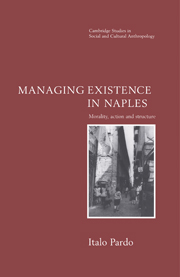Book contents
- Frontmatter
- Contents
- Preface
- Map 1 The province of Naples
- Map 2 The districts of Naples
- 1 Issues of anthropological research in urban Europe
- 2 Beyond unemployment: work, morality and entrepreneurship
- 3 Entrepreneurial morality and ethics among the young: changing social and cultural relations
- 4 Acceptance vs. discernment: the morals of family, kinship and neighbourhood as resource options
- 5 Transgression, control and exchange: the rationality of the ambiguous and the liminal in life and death
- 6 The mass diffusion of contacts: redefined power relations, values of representation
- 7 The relation of agency to organization and structure: deconstructed polarizations at the grassroots of democracy
- Notes
- References
- Index
- Cambridge Studies in Social and Cultural Anthropology
2 - Beyond unemployment: work, morality and entrepreneurship
- Frontmatter
- Contents
- Preface
- Map 1 The province of Naples
- Map 2 The districts of Naples
- 1 Issues of anthropological research in urban Europe
- 2 Beyond unemployment: work, morality and entrepreneurship
- 3 Entrepreneurial morality and ethics among the young: changing social and cultural relations
- 4 Acceptance vs. discernment: the morals of family, kinship and neighbourhood as resource options
- 5 Transgression, control and exchange: the rationality of the ambiguous and the liminal in life and death
- 6 The mass diffusion of contacts: redefined power relations, values of representation
- 7 The relation of agency to organization and structure: deconstructed polarizations at the grassroots of democracy
- Notes
- References
- Index
- Cambridge Studies in Social and Cultural Anthropology
Summary
Informal work activities have only recently attracted attention, despite their traditional significance in the lives of real people whether they are Londoners (Wallman 1984; Hobbs 1989), Neapolitans (Pinnarò and Pugliese 1985), or something else. My enquiry into what the officially unemployed in Naples actually do and into their attitudes to work originally accepted the distinction between ‘employment’, including all types of formal and paid labour, and ‘work’, including also non-formal labour paid in cash or otherwise (Gershuny and Pahl 1979; Pahl 1984). This distinction accounts for the informal or reciprocal work activities (see also Wallace and Pahl 1985) which, according to Wallman (1979: 15), find space outside the formal structure or in its cracks. Pahl's (1980: 160) hypothesis of the revolutionary potential of informal work raises fascinating issues in the Naples situation, but it also poses problems. This form of labour, postulated as a separate ‘mode of production’ in the broader category of the informal sector, is seen to include, vaguely, ‘black labour’, small-scale undeclared production, and so on.
My perspective became more complex as the investigation of local people's attitudes to employment and work highlighted the arbitrary value that this distinction gives to the material and the monetary. The many formally unemployed popolino and petty bourgeois individuals whom I have met simply cannot be said to be participating in a ‘casual economy’ (Allum 1973; Becchi-Collidà 1984a) in which the Camorristi (sing. Camorrista, organized criminals) are powerful employers.
- Type
- Chapter
- Information
- Managing Existence in NaplesMorality, Action and Structure, pp. 19 - 62Publisher: Cambridge University PressPrint publication year: 1996



